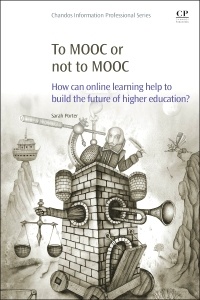To MOOC or Not to MOOC How Can Online Learning Help to Build the Future of Higher Education?
Auteur : Porter Sarah

Scarcely a week goes by without coverage in the UK and international media about the latest MOOC revelation. Despite some significant initiatives in the dotcom era, online learning has somehow never delivered on its promise to revolutionize education. To MOOC or not to MOOC explores the history of MOOCs and analyses the current MOOC context by describing six institutions and the story of their engagement with MOOCs. Looking at each of the different type of institution in turn, it analyses the processes behind their decision to engage with online learning and MOOCs, how the MOOC project is managed and led, and discusses issues such as quality assurance, governance and partnerships. Chapters draw together and analyse the data and draw out advice for institutions, to help them make choices about how to respond to MOOCs and other high-impact changes in digital education. The book contains checklists and planning tools to support strategy and planning, and concludes with a future look at MOOCs exploring some of the possible trends that may impact upon higher education, such as business models, data and analytics, learning design and competitors in the MOOC marketplace.
- Part One
- Chapter 1: What are MOOCs?
- Chapter 2: The MOOCosphere
- Chapter 3: Examples of MOOCs
- Chapter 4: Introduction to the case studies
- Chapter 5: The confident entrepreneurs
- Chapter 6: The old hands: experts in online and distance learning
- Chapter 7: The institutional innovators
- Chapter 8: The opportunists
- Chapter 9: The cautious experimenters
- Chapter 10: The old guard
- Chapter 11: Key issues that emerged from the case studies
- Chapter 12: Planning the MOOC project
- Chapter 13: Planning your MOOC—costings
- Chapter 14: Business models for MOOCs
- Chapter 15: Additional benefits of MOOCs
- Part Two: Looking to the future
- Chapter 16 Understanding your market—the learner as consumer
- Chapter 17 Data and analytics
- Chapter 18 The developing MOOC market
- Appendix A
- Appendix B
- Appendix C
- Index
- Aimed at higher educational professionals who are interested in the strategic importance and potential of online learning
- Written from an understanding of the strategic context for senior managers in universities
- Focus upon a major trend in technology and education illustrated by concrete examples of real practice in institutions
- Implement case studies to draw out conclusions not only about online learning but also decision-making and innovation
Date de parution : 05-2015
Ouvrage de 156 p.
15x22.8 cm
Thèmes de To MOOC or Not to MOOC :
Mots-clés :
accreditation; Adaptive learning; Analytics; Approaches; benefits; Benefits identification; business models; business planning; c-MOOC; Case studies; Comparison; Corporate MOOCs; costings; Coursera; Data; Decision making; Decision-making; Definitions; Differentiation; Distance learning; E-learning; e-learning strategy; EdX and Udacity; Elite; Flipping the classroom; FutureLearn; Higher education; History; income generation; Institutional strategy; Learner preferences; Learners; Learning analytics; Learning design; MOOC design; MOOC examples; MOOC models; MOOC strategy; MOOCosphere; MOOCs; Motivation; Online and distance learning; Online learning; Open educational resources; Overseas campus; Partnerships; Personalization; Perspectives; Planning; profile-raising; Program management; Project management; Quality assurance; relationship building; Research intensive; revenue models; SPOCs; strategy; Technology enhanced learning; Technology-enhanced learning; Unbundling; Universities; x-MOOC



